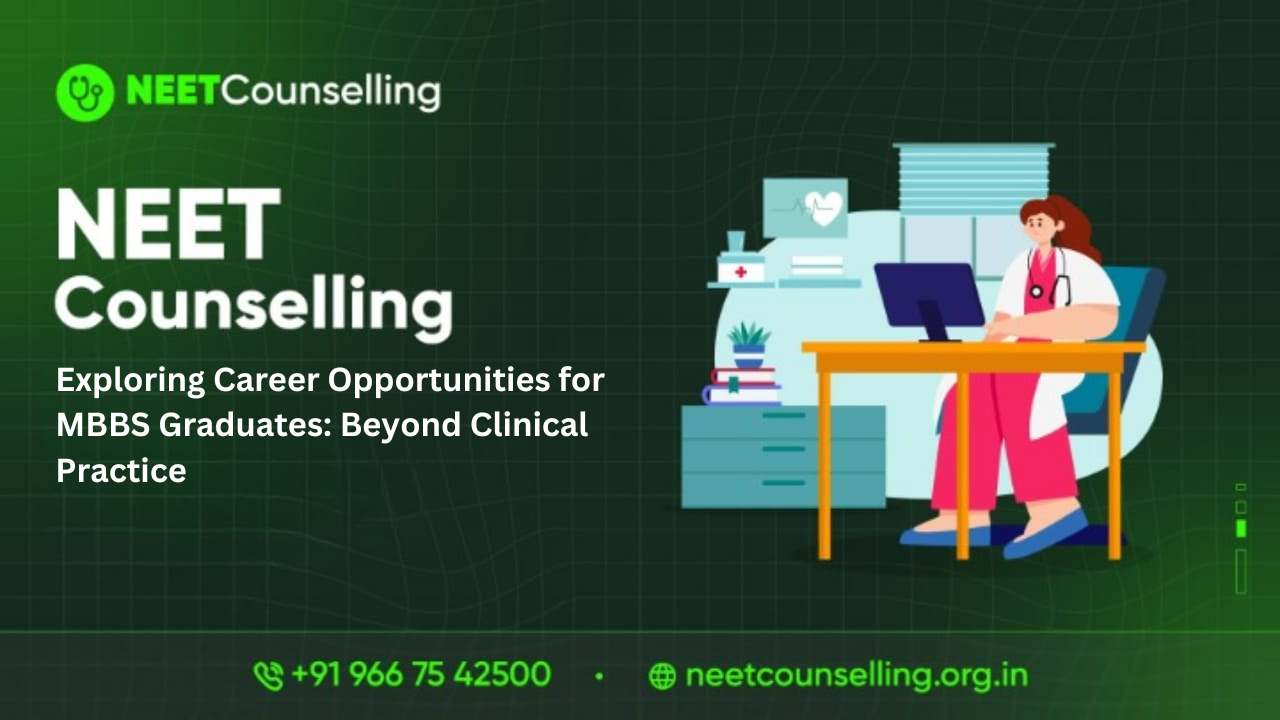An MBBS degree equips you with a wealth of knowledge and a refined skill set. While the traditional path leads towards clinical practice, a multitude of exciting opportunities lie beyond the walls of the hospital. This diverse landscape allows you to leverage your medical expertise in various fields, catering to your individual interests and aspirations.
The world of research and academia calls upon curious minds. You can pursue a Master’s degree or PhD in a specialized medical field, exploring specific areas of disease, treatment, or healthcare technology. You can contribute to groundbreaking medical research and development, pushing the limits of knowledge to enhance patient care. Alternatively, a career in medical education enables you to cultivate future generations of doctors by sharing your expertise as a professor, lecturer, or curriculum developer.
Your medical background positions you well for leadership roles in healthcare management and administration. Hospitals offer management positions overseeing operations, patient care quality, and staff development. Public health administration allows you to influence healthcare policy on a larger scale by developing and implementing health initiatives within government agencies or NGOs. The medical insurance sector and healthcare delivery systems also require expertise in medical practices and costs, making your knowledge highly valuable.
Contents [show]
Research and Academia: Expanding the Frontiers of Medicine
Pursuing an MBBS degree can unlock a realm of intellectual exploration in research and academia, offering a plethora of exciting pathways to consider:
- Enrolling in a Master’s Degree or PhD program in Medical Sciences can enhance your expertise in a particular medical domain. You can opt for specializations like cardiology, oncology, or public health. Typically, Master’s programs span one to two years, whereas PhD programs necessitate a more extensive research commitment of several years.
- By participating in medical research and development, you can drive innovative breakthroughs that transform healthcare and enhance patient outcomes. Collaborate on research initiatives with universities, hospitals, or pharmaceutical companies to create novel diagnostic tools, treatment approaches, or cutting-edge medical technologies. Your involvement can make a significant impact on the field of medicine
- Embark on a Medical Education Career: Cultivate Upcoming Physicians: Assume the role of a professor, lecturer, or curriculum designer at medical institutions or universities to mold the forthcoming generation of medical experts. Disseminate your expertise and wisdom, motivate and steer aspiring doctors on their paths, and aid in the creation of inventive teaching techniques while guaranteeing a robust basis for medical education.
Healthcare Systems: Pioneering the Path with Management and Administration
Beyond clinical practice, your MBBS degree provides you with valuable knowledge and leadership skills that can be applied in healthcare management and administration. This dynamic field offers an opportunity to utilize your expertise in shaping healthcare systems.
- Skilled individuals are needed to manage and lead hospitals, overseeing operations, patient care quality, and staff development. Consider pursuing roles such as Medical Superintendent, Hospital Administrator, or Departmental Head. Utilize your medical expertise to make informed decisions regarding resource allocation, budgeting, and ensuring efficient delivery of patient care.
- As a professional in Public Health Administration and Policy Development, you have the opportunity to impact healthcare policy on a broader level. You can work in government agencies or non-governmental organizations, where you can influence public health initiatives, disease prevention strategies, and the allocation of healthcare resources. Your medical expertise enables you to connect policy and practice, guaranteeing the successful implementation of public health programs.
- Expertise in medical practices and costs is essential for the medical insurance sector and healthcare delivery systems. Consider a career as a Medical Underwriter, responsible for evaluating risks associated with medical insurance policies. Alternatively, you can contribute to the design and implementation of healthcare delivery systems, ensuring that diverse populations have access to efficient and accessible healthcare services.
Increasing the Scope of Public Health and Community Engagement
- Your medical expertise extends beyond individual patient care, as you can use it to ensure the well-being of entire communities through public health and community outreach initiatives.
- Preventive Medicine and Disease Surveillance focuses on avoiding the occurrence of illnesses. In this field, professionals collaborate with public health agencies or NGOs to devise and implement programs geared towards disease prevention, conducting immunization campaigns as well as initiating early detection efforts. As a key player in monitoring and assessing instances of outbreak, you can provide valuable information for public health interventions.
- To tackle health challenges across the world, partner with NGOs and international healthcare organizations. Joining forces with institutions like WHO can make a significant difference in addressing health issues affecting disadvantaged societies worldwide. Your medical proficiency is crucial in various areas such as delivering emergency aid, providing medical care to conflict zones or implementing healthcare programs for developing nations.
- By collaborating with local organizations or government agencies, communities can be empowered to take control of their health. Through the creation and implementation of informative health education initiatives, greater awareness about healthy living practices, prevention tactics for diseases and easy access healthcare resources can be achieved. Your participation in this process is crucial as it will encourage positive health habits and ultimately contribute towards improving community wellbeing.
Frequently Asked Questions
Q What skills are essential for a career in healthcare management?
A. In addition to your medical knowledge, strong leadership, communication, business acumen, and decision-making skills are crucial for success in healthcare management. Understanding financial management principles and healthcare regulations is also beneficial.
Q. How can I prepare for a career in public health administration?
A, Consider pursuing a Master’s in Public Health (MPH) degree. This specialized program equips you with the knowledge and skills in epidemiology, health policy, program development, and community health to excel in public health administration roles.
Q. Are there opportunities to work abroad with my medical degree?
A. Absolutely! International organizations like the WHO, Doctors Without Borders, and various NGOs actively seek medical professionals. Strong language skills and cultural sensitivity can be assets in such roles.
Q. How can I find out more about non-clinical medical careers?
- Medical college career counseling centers: Many medical colleges offer career guidance services that can provide information on non-clinical options.
- Professional associations: Associations like the Indian Medical Association (IMA) or specialty-specific associations might offer resources or career guidance programs.
- Online resources: Websites and publications dedicated to healthcare careers can provide valuable insights into non-clinical options.
Q. Is a non-clinical career path less valuable than clinical practice?
A. Not at all! Non-clinical careers offer diverse and impactful opportunities to contribute to healthcare. The value lies in utilizing your medical expertise in ways that align with your interests and desired impact on the healthcare system.
My name is Rajesh Mishra. For the past 18 years, I have been helping students get admission into the right colleges. I believe that even students with average or low ranks deserve admission in good colleges—without chasing agents, falling for false promises, or paying donations.
To share my experience and guidance with more students, I write blogs on NEET, Engineering, and AYUSH counselling.
You can connect with me directly through social media and other platforms.


